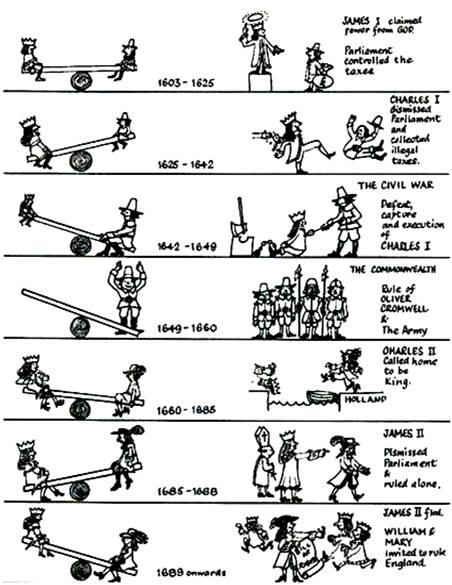English Government - Foundations
Aim: How did Limited Monarchy develop in England?
Do Now: What prevents the police from coming into your apartment/house in the middle of the night, pulling you out of your bed and executing you in the street?
King John - Magna Carta
The first king to give up some of his power was John. He is famous as Prince John in make believe stories of Robin Hood. In the stories he is a wicked and foolish prince who taxes the people of England unfairly. Some historians say John was just as foolish in real life. Others say he was simply unlucky!
The problems King John faced:
- CHURCH
- John disagreed with the Pope about how to run the Church. From 1208 until 1213, the Pope banned all church services in England and English people feared that they would all go to HELL! Some Church leaders blamed John for the trouble
- LOST WARS
- John went to war twice against the French king. His army was badly beaten both times. He lost almost all the land that his father had gained in France!
- RAISED TAXES
- John raised taxes in England to pay for the wars. This upset his BARONS! He ordered them to pay far more tax than earlier kings had done!
In 1214 many barons rebelled against John. They believed that he could not rule the country properly and was treating them unfairly.
Magna Carta, 1215
In 1215, they surrounded the King and his Army on a field at Runnymede and forced him to sign the Magna Carta or Great Charter.
- King John I forced to accept it.
- A list of demands made by the nobility.
- Created a CONTRACT between the king and the aristocracy.
- Established principles which limited the power of the king:
- Not to imprison nobles without trial
- That trials must be in courts: trial by jury with peers; not held in secret by King
- To have fair taxation for the nobles
- To let freemen travel wherever they like
- Not to interfere in Church matters
- Not to seize crops without paying for them
Model Parliament, 1295
- King Edward I brought his military leaders and nobility together as a Parliament to ask their consent to new taxes.
- Established the principle of parliamentary “power of the purse.”
- A radical new idea for any monarch to ask for anything!
The Petition of Rights, 1628
- In return for money to fund his wars, King Charles I agreed:
- No imprisonment without due cause.
- No taxation without Parliament’s consent.
- No putting soldiers in private homes.
- No martial law during peacetime.
- Charles signed it, and then ignored it, dissolving Parliament!
English Bill of Rights, 1689
- It settled all of the major issues between King & Parliament.
- It served as a model for the U. S. Bill of Rights.
- It also formed a base for the steady expansion of civil liberties in the 18c and early 19c in England.
Main provisions:
- The King could not suspend the operation of laws.
- The King could not interfere with the ordinary course of justice.
- No taxes levied or standard army maintained in peacetime without Parliament’s consent.
- Freedom of speech in Parliament.
- Sessions of Parliament would be held frequently.
- Subjects had the right of bail, petition, and freedom from excessive fines and cruel and unusual punishment.
- The monarch must be a Protestant.
- Freedom from arbitrary arrest.
- Censorship of the press was dropped.
- Religious toleration.
Classwork & Homework
Lesson PowerPoint: The Development of Constitutional Monarchy in England/Great Britain
Lesson Activity: Development of Constitutional Government in England
Homework: Assignments
